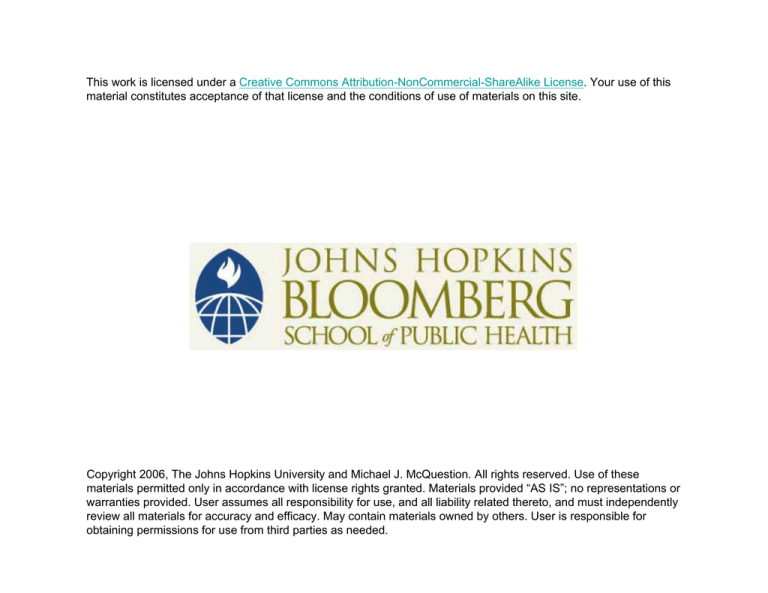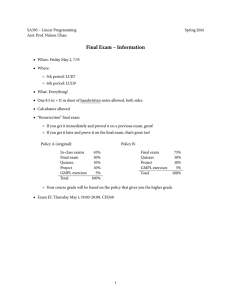
This work is licensed under a Creative Commons Attribution-NonCommercial-ShareAlike License. Your use of this
material constitutes acceptance of that license and the conditions of use of materials on this site.
Copyright 2006, The Johns Hopkins University and Michael J. McQuestion. All rights reserved. Use of these
materials permitted only in accordance with license rights granted. Materials provided “AS IS”; no representations or
warranties provided. User assumes all responsibility for use, and all liability related thereto, and must independently
review all materials for accuracy and efficacy. May contain materials owned by others. User is responsible for
obtaining permissions for use from third parties as needed.
Course Introduction
Michael J. McQuestion, PhD, MPH
Johns Hopkins University
Introduction
Peace Corps volunteer, rural public health, The
Philippines
Technical officer in WHO/PAHO
Global supervisor, PolioPlus Program, The Rotary
Foundation
Current research on demographic impacts of
primary health care programs
2
Whom to Contact
Prof. McQuestion: psip@jhsph.edu
− For all substantive queries
Deborah Vazirani: psip@jhsph.edu
− For all curriculum-related matters (including
assignments)
DEhelp
− For all technical issues
3
Theory of the Course
Highlight, theorize, and analyze problems that
program managers typically face
Identify similarities and dissimilarities between
developed and developing countries
Integrate case studies with current journal articles
Reward theoretical synthesis while emphasizing a
problem-solving approach
4
What’s Expected
Complete all required readings before viewing
lectures
Focus on theoretical, practical aspects of the
readings rather than methodological details
View every lecture
Participate actively in LiveTalks and BBS
Turn in all assignments on time
5
Readings
Readings are mostly current refereed journal
articles; some are technical reports
You must read all required readings
You can also draw from recommended readings
There is no course pack
− All readings are available in PDF format
6
Quizzes
There are six quizzes for Modules 1–5
Do them after completing all required readings and
viewing the corresponding lectures
They are worth 30% of your grade
7
Small Group Exercises
The class will be divided into small groups
Each group will complete Exercises 2, 3, and 4
− Exercise 1 is an individual exercise
The exercises are worth 30% of your grade
After all four exercises have been submitted,
members from each group are required to
complete and submit peer evaluations
Peer evaluations will be factored into the grading
8
Web Links
Some lectures feature links to related Web sites
You are encouraged (but not required) to visit them
and draw from them in the exercises
9
Bulletin Board
The BBS is a tool for enhancing learning
Use it to share questions and insights with other
class members
We will monitor it and contribute as appropriate
10
LiveTalks
LiveTalks will be used to integrate the material
covered in each module
Be prepared to discuss any topic covered
All are expected to participate
Archived LiveTalks are available
11
Grading
Exercises (70%)
− Exercises 1–4 (30%)
− Quizzes (30%)
− CASA (10%)
Participation (5%)
− Read lectures
− Bulletin boards, LiveTalks
Final exam (25%)
− Short-answer questions (cumulative)
Extra credit (6%)
− Optional three exercises: WHO Technet; U.S.
Immunization Program CASA/AFIX; and GAVI
12
Tools: CASA
CASA is a free software program developed by
CDC which you will download and use in an
exercise analyzing immunization records
Work through the CASA tutorial before attempting
the assignment
13
Online Evaluations
Do the online evaluations after each lecture
They are quite short and will help us improve the
course
All online evaluations are anonymous and will not
affect your grade
14
Lecture Evaluation
Your feedback on this lecture
presentation is very important and will
be used for future revisions. Please
take a moment to evaluate this
lecture. The Evaluation link is
available on the lecture page.
15

